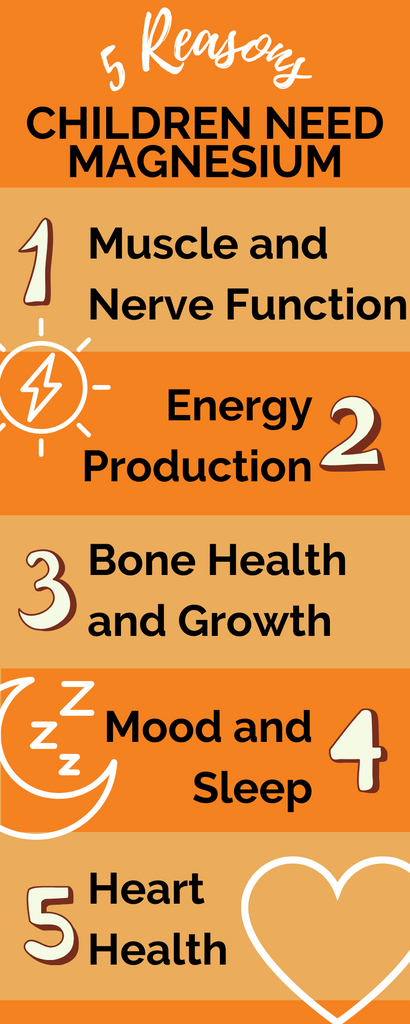5 Reason Children Need Magnesium
April 02, 2024
Magnesium is indispensable for all ages, serving as a key biological element and one of the most abundant electrolytes in the human body. Despite its paramount importance, deficiencies in magnesium are prevalent not only among adults but also among children and young adults.
Functions of Magnesium in Children
Muscle and Nerve Function
Magnesium is essential for muscle function and nerve transmission. Sufficient magnesium levels help prevent cramps and spasms in children, allowing them to move and play comfortably1.
Energy Production
Magnesium helps the body produce and utilize energy. It aids in the conversion of food into energy, which is essential for children who lead active lifestyles and require plenty of energy for growth and development.
Bone Health and Growth
Magnesium is essential for the proper utilization of other vital nutrients like vitamin D, iron, calcium, zinc, and potassium. Without adequate magnesium, the effectiveness of these nutrients diminishes, potentially hindering bone growth and development. It regulates calcium levels in the body and contributes to bone density, reducing the risk of fractures and osteoporosis later in life. 2
Mood and Sleep
Magnesium also exerts a notable influence on a child's mood and state of calmness. Its calming effects contribute to facilitating better sleep, a crucial factor in a child's overall well-being. Conversely, a lack of magnesium has been linked to increased aggression, anger, trouble sleeping, and irritability in children3.
Heart Health
Magnesium helps maintain a regular heartbeat and supporting cardiovascular function. Ensuring an adequate intake of magnesium from a young age may promote heart health and reduce the risk of heart-related issues in adulthood.
Signs of Magnesium Deficiency in Children
Identifying magnesium deficiency in children can be difficult as the symptoms are often subtle and can mimic other conditions. However, some signs to watch out for include4:
- Muscle cramps or spasms
- Irritability or mood swings
- Fatigue or weakness
- Poor appetite
- Nausea or vomiting
- Abnormal heart rhythms
Parents should consult a healthcare professional if they suspect their child is magnesium deficient.
Factors Contributing to Magnesium Deficiency in Children
Recognizing the signs of magnesium deficiencies in children is essential for timely intervention. Several factors contribute to magnesium deficiencies in children, and understanding these can help parents address potential issues5.
Lack of Intake Through Diet
- Picky eating habits can lead to insufficient magnesium intake.
- Foods like meat and refined carbs provide minimal magnesium.
- Processed foods can reduce magnesium absorption by up to 300%.
- The absorption of magnesium is hindered by high-salt and sugar diets.
Inability To Absorb Magnesium
Underlying vitamin D deficiency or frequent antibiotic use can reduce magnesium absorption.
Magnesium Loss Leading To Deficiency
Active children with increased sweat production may lose more magnesium.
Stress and anxiety, especially related to school or friendships, can contribute to magnesium loss.
Daily Magnesium Requirements for Children
It's crucial to be aware of the recommended daily magnesium intake for different age groups7:
- Birth to 6 months: 30mg
- 7-12 months: 75mg
- 1-3 years: 80mg
- 4-8 years: 130mg
- 9-13 years: 240mg
- 14-18 years: 350-410mg
Tips for Ensuring Adequate Magnesium Intake
Offer a Balanced Diet: Encourage children to eat a variety of magnesium-rich foods as part of a balanced diet.
Limit Processed Foods: Processed foods, such as sugary snacks and sodas, tend to be low in magnesium and high in unhealthy fats and sugars. Limiting these foods can help ensure children get enough magnesium from nutrient-dense sources.
Cook with Magnesium-Rich Ingredients: Incorporate magnesium-rich ingredients into meals and snacks, such as leafy greens in salads, nuts and seeds in trail mix, and whole grains in pasta dishes or stir-fries.
Make it Fun: Get creative in the kitchen by involving children in meal preparation and experimenting with new recipes featuring magnesium-rich foods.
Consider Supplementation if Necessary: While most children can get an adequate amount of magnesium from their diet, some may require supplementation, especially if they have certain health conditions or dietary restrictions that affect magnesium absorption. However, it's essential to consult a pediatrician before giving children magnesium supplements to ensure proper dosage and safety.
Magnesium Bath for Efficient Absorption: A creative and efficient way to ensure magnesium absorption is through a magnesium bath. By adding half a cup of OSI Magnesium Bath Flakes and some bubble mix to bath time, children can absorb magnesium almost immediately.
The Bottom Line
Magnesium plays an indispensable role in promoting children's overall health and well-being, influencing vital processes such as bone development, mood regulation, and metabolic function. By prioritizing magnesium intake during childhood, we pave the way for healthier growth, development, and long-term well-being.

